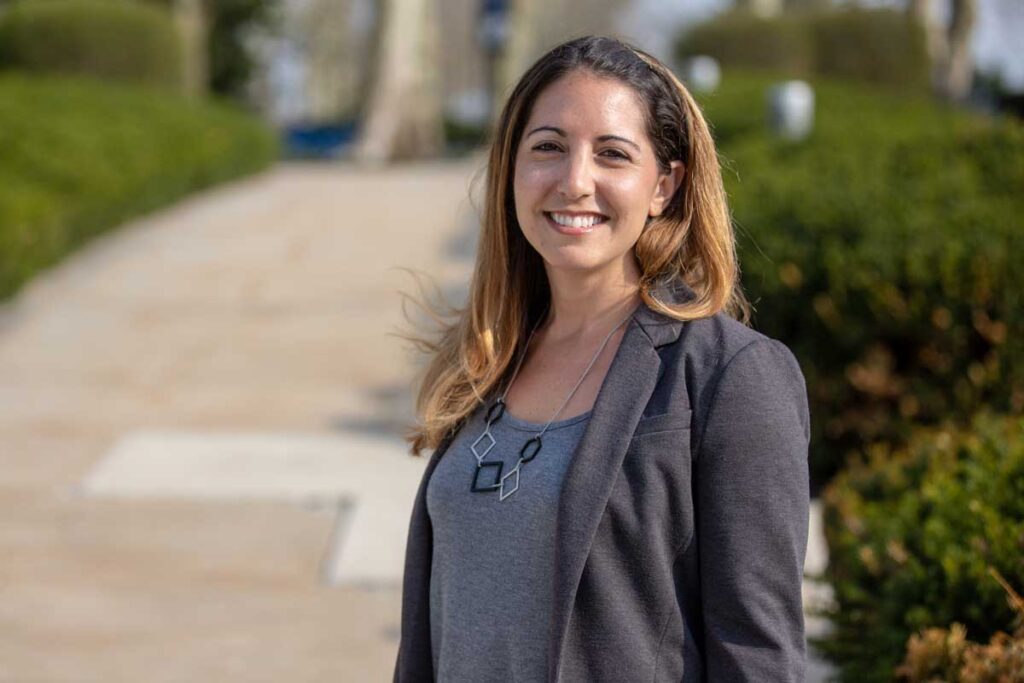
Psy.D. Student from Argentina Attains Career Goal in U.S.
Gisela Vega grew up loving the sun and water. In Mar de Plata, the biggest seaside beach resort in Argentina, she would drink mate tea, which is made with the leaves of the local yerba mate plant, and socialize with friends and family.
This summer, Gisela is relocating from Pennsylvania to sunny Long Beach, Calif. to complete her yearlong post-doctoral training at a group practice where she will serve as a therapist. It is her last step toward earning her license in clinical psychology. Since coming to Pennsylvania in 2011 with a non-profit organization that sponsored her work visa, Gisela has spent six years at Immaculata University pursuing her Psy.D. She graduated in May 2019.
Wanting to be a psychologist, she earned her undergraduate and master’s degrees from Argentina. However, in the United States, one is required to hold a doctoral degree to practice clinical psychology so she needed to continue her education. Her options for graduate school were limited because she had to take evening classes. She was relieved when she discovered Immaculata’s program.
“Immaculata did a lot for me in order to accommodate my needs,” she says, explaining that she needed to work full-time while in the Psy.D. program and was grateful that the faculty were able to meet with her later in the day and were flexible. Sister Monica Acri, IHM, Psy.D., associate professor of psychology, was Gisela’s advisor and supported her throughout the program, along with the other faculty members, including Jed Yalof, Psy.D., A.B.P.P., chair of the Department of Psychology and Counseling, who served as Gisela’s dissertation chair.
Although she was familiar with English before she arrived in the U.S., Gisela struggled with the language. She remembers seeking Sister Monica’s help with English, which was especially important because Gisela was doing her practicum at a private school and needed to evaluate students’ pronunciation, writing and composition. Sister Monica provided some tips that helped Gisela, included listening to audio books and just relaxing.
“Slang is hard for me, but I am way better than when I started,” she says with a broad smile. “I’m going to be a therapist working with clients, teenagers, they come up with words that…oh my God, what is this?” she says, letting out her laughter with appreciation for the challenges she will be facing. In Argentina, Gisela worked with children with autism in a hospital before relocating to Pennsylvania.
Planning to remain in the United States on her Green Card, she is working toward permanent U.S. citizenship. However, Gisela’s acclimation to the American way of life has not been easy. In addition to language, she recognizes that Americans are more diverse in relation to nationality and race than what she experienced in Argentina. She states that diversity is typically delineated by economic or educational status in Argentina. She also had to become accustomed to long commutes, often in adverse weather conditions.
During her internship, Gisela worked 40 hours a week at Upper Bay Counseling and Support Services, a community mental health facility in Maryland, while continuing to work with autistic children. Working with clients ranging in age from 6 to 82, she appreciates the depth of knowledge that she acquired, such as providing couples therapy, which she is now considering as a career focus. Another area that interests her is psychological evaluations for recruits seeking law enforcement positions. This includes in-depth interviews and personality assessments that can determine if the candidates, most of whom are 18- or 19-year-old young men, can handle stress, follow commands, and not overuse their authority.
For her post-doc training, Gisela wanted to secure a position in California, which reminds her of Argentina. She applied to several internship sites while her fiancé, a native Philadelphian, also applied and accepted a new position near Long Beach, Calif. They are excited for what lies ahead.
Even though she has adjusted to life in America, there were certain rituals and routines that she wanted to remain the same. “We eat much later in my country,” she says, laughing. Gisela acknowledged that her fiancé made many accommodations—he eats later now too. “For me, it’s not about the eating, it’s about sitting at the table and talking—connecting,” she asserts.
Reflecting back on her six years at Immaculata, Gisela is proud of her accomplishments and the obstacles that she has overcome. “I wish I would have enjoyed it a little more,” she admits. She often felt rushed and a little overwhelmed with her job, class, papers and practicums. She understands the importance of taking care of yourself and surrounding yourself with the right people. She is determined to devote this year to more self-care. She chuckles when she thinks, “We work with mental health issues, but we hardly ever ask, ‘How am I doing?’”
Having the emotional and social support of friends and family is key to being a successful student—and person! Plus, she recommends enjoying some tea with friends.